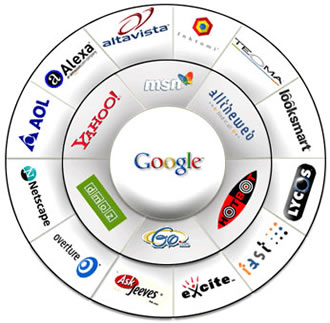| | |
|

Search engine optimization (SEO) is the process of improving the volume and quality of traffic to a web site from search engines via "natural" ("organic" or "algorithmic") search results. Usually, the earlier a site is presented in the search results, or the higher it "ranks," the more searchers will visit that site. SEO can also target different kinds of search, including image search, local search, and industry-specific vertical search engines.
As a marketing strategy for increasing a site's relevancy, SEO considers how search algorithms work and what people search for. SEO efforts may involve a site's coding, presentation, and structure, as well as fixing problems that could prevent search engine indexing programs from fully spidering a site. Other, more noticeable efforts may include adding unique content to a site, and making sure that the content is easily indexed by search engines and also appeals to human visitors.

The acronym "SEO" can also refer to "search engine optimizers," a term adopted by an industry of consultants who carry out optimization projects on behalf of clients, and by employees who perform SEO services in-house. Search engine optimizers may offer SEO as a stand-alone service or as a part of a broader marketing campaign. Because effective SEO may require changes to the HTML source code of a site, SEO tactics may be incorporated into web site development and design. The term "search engine friendly" may be used to describe web site designs, menus, content management systems and shopping carts that are easy to optimize.
The leading search engines, Google, Yahoo! and Microsoft, use crawlers to find pages for their algorithmic search results. Pages that are linked from other search engine indexed pages do not need to be submitted because they are found automatically.
 Some search engines, notably Yahoo!, operate a paid submission service that guarantee crawling for either a set fee or cost per click. Such programs usually guarantee inclusion in the database, but do not guarantee specific ranking within the search results. Yahoo's paid inclusion program has drawn criticism from advertisers and competitors. Two major directories, the Yahoo Directory and the Open Directory Project both require manual submission and human editorial review. Google offers Google Sitemaps, for which an XML type feed can be created and submitted for free to ensure that all pages are found, especially pages that aren't discoverable by automatically following links.
Search engine crawlers may look at a number of different factors when crawling a site. Not every page is indexed by the search engines. Distance of pages from the root directory of a site may also be a factor in whether or not pages get crawled.
Some search engines, notably Yahoo!, operate a paid submission service that guarantee crawling for either a set fee or cost per click. Such programs usually guarantee inclusion in the database, but do not guarantee specific ranking within the search results. Yahoo's paid inclusion program has drawn criticism from advertisers and competitors. Two major directories, the Yahoo Directory and the Open Directory Project both require manual submission and human editorial review. Google offers Google Sitemaps, for which an XML type feed can be created and submitted for free to ensure that all pages are found, especially pages that aren't discoverable by automatically following links.
Search engine crawlers may look at a number of different factors when crawling a site. Not every page is indexed by the search engines. Distance of pages from the root directory of a site may also be a factor in whether or not pages get crawled.
|
|
| |

 |
|
|
| | |
Search engine optimization (SEO) As a marketing strategy
Search engine optimization ( SEO ) Eye tracking studies have shown that searchers scan a search results page from top to bottom and left to right, looking for a relevant result. Placement at or near the top of the rankings therefore increases the number of searchers who will visit a site. However, more search engine referrals does not guarantee more sales. SEO is not necessarily an appropriate strategy for every website, and other Internet marketing strategies can be much more effective, depending on the site operator's goals.A successful Internet marketing campaign may drive organic search results to pages, but it also may involve the use of paid advertising on search engines and other pages, building high quality web pages to engage and persuade, addressing technical issues that may keep search engines from crawling and indexing those sites, setting up analytics programs to enable site owners to measure their successes, and improving a site's conversion rate.

SEO may generate a return on investment. However, search engines are not paid for organic search traffic, their algorithms change, and there are no guarantees of continued referrals. Due to this lack of guarantees and certainty, a business that relies heavily on search engine traffic can suffer major losses if the search engines stop sending visitors. According to notable technologist Jakob Nielsen, website operators should liberate themselves from dependence on search engine traffic. A top ranked SEO blog Seomoz.org has reported, "Search marketers, in a twist of irony, receive a very small share of their traffic from search engines." Instead, their main sources of traffic are links from other websites.
The search engines' market shares vary from market to market, as does competition. In 2003, Danny Sullivan stated that Google represented about 75% of all searches. In markets outside the United States, Google's share is often larger, and Google remains the dominant search engine worldwide as of 2007. As of 2006, Google held about 40% of the market in the United States, but Google had an 85-90% market share in Germany. While there were hundreds of SEO firms in the US at that time, there were only about five in Germany.
In Russia the situation is reversed. Local search engine Yandex controls 50% of the paid advertising revenue, while Google has less than 9%. In China, Baidu continues to lead in market share, although Google has been gaining share as of 2007.
Successful search engine optimization ( SEO ) for international markets may require professional translation of web pages, registration of a domain name with a top level domain in the target market, and web hosting that provides a local IP address. Otherwise, the fundamental elements of search engine optimization ( SEO ) are essentially the same, regardless of language.
|
|
|